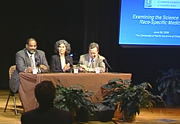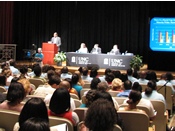


Your guide to minority health-related activities
at UNC-CH and elsewhere
at UNC-CH and elsewhere
 |
 |
|||
 |
||||
|
Your guide to minority health-related activities at UNC-CH and elsewhere |
||||
| 17th
Annual Summer Public Health Research Resources |
The panel provided insights on how, despite an abundance of information about healthy lifestyles and the most advanced medical care in the world, millions of Americans experience needlessly poor health and don't practice healthy behaviors. For many, the path to a healthy or unhealthy life is influenced by factors largely beyond their control, like the neighborhoods they grew up in, their parents' income and level of education, and the stress they've experienced in their daily lives. The costs of poor health are borne not only by individuals but by their families and, ultimately, by all Americans. (Link) |
|
|
Videoconference information Return to the Videoconference home page | |
|
Minority Health Project| Department of Epidemiology UNC Gillings School of Global Public Health E-mail Minority_Health@unc.edu
Last updated: 4/6,12/2011, 5/24/2011, 8/2/2011 by Vic |